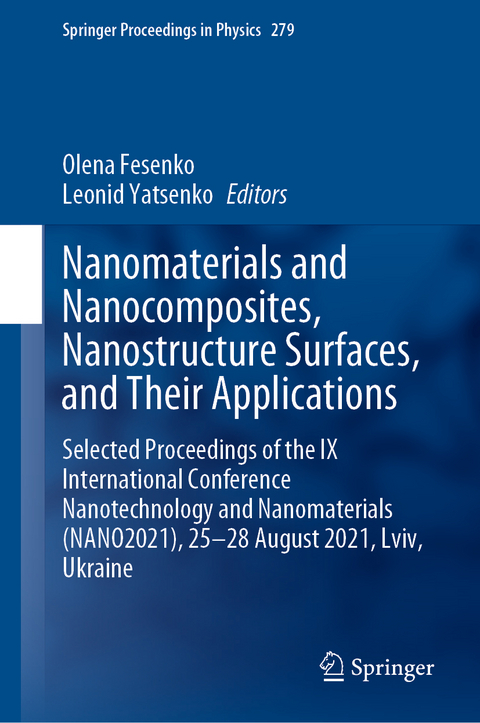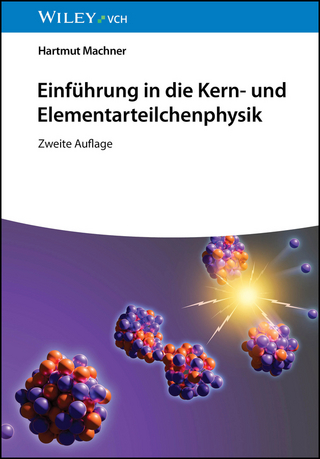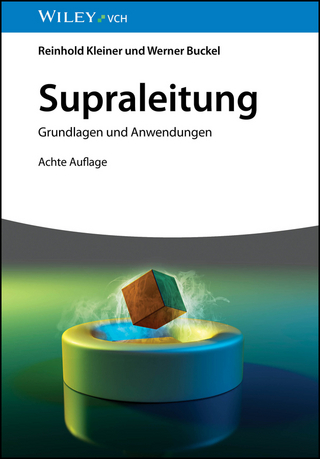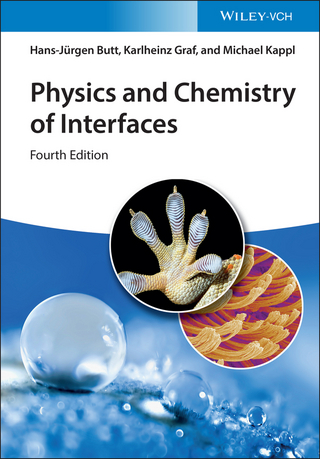
Nanomaterials and Nanocomposites, Nanostructure Surfaces, and Their Applications
Springer International Publishing (Verlag)
978-3-031-18095-8 (ISBN)
This book highlights some of the latest advances in nanotechnology and nanomaterials from leading researchers in Ukraine, Europe and beyond. It features contributions presented at the 8th International Science and Practice Conference Nanotechnology and Nanomaterials (NANO2020), which was held on August 25-28, 2021 at Lviv Polytechnic National University, and was jointly organized by the Institute of Physics, the National Academy of Sciences of Ukraine, Lviv Polytechnic National University, University of Tartu (Estonia), University of Turin (Italy), Pierre and Marie Curie University (France), European Profiles S.A. (Greece), Representation of the Polish Academy of Sciences in Kyiv, University of Angers (France), Ruprecht Karl University of Heidelberg (Germany). Internationally recognized experts from a wide range of universities and research institutions share their knowledge and key findings on material properties, behavior, and synthesis. This book's companion volume also addresses topics such as nano-optics, energy storage, and biomedical applications.
Part 1: Nanomaterials and Nanocomposites.- Properties of liquid systems within nano-structure in the vicinity of a critical point.- Electron Tunneling in Heterostructures with Germanium Quantum Dots.- Thermodynamic Analysis Of The Process Obtaining Promoted Iron In Various Gaseous Media.- Formation of Carbon Nanotubes from Products of Methane Air Conversion on Ni/Cr and Fe Catalysts.- Generalized Constitutive Equations And Coupled Phenomena At The Nanoscale: Applications To Nanofluidics.- Investigation of long-term oxidation resistance of titanium alloys with a coating based on Ti-Al-C system nanocomposites.- Analytical Solutions for N-Electron Interacting System Conned in Graph of Coupled Electrostatic Semiconductor and Superconducting Quantum Dots in Tight-Binding Model with Focus on Quantum Information Processing.- Morphology And Physicomechanical Properties Of Antifriction Epoxy Nanocomposite.- Advanced carbon nanomaterials and their composites for removal of U(VI)compounds from aqueous solutions.- The Effect of Ultra-Fine Alloying Elements on High-Temperature Strength and Fracture Toughness of Ti-Si-X and Ti-Cr-X Composites.- The study of properties of mechanochemical and ultrasonic treated BaO/ZrO2 composites.- State of the art of microplastic and nanoplastic pollution: origin and removal methods.- Nanostructured iron-based sorption materials for drinking water and wastewater treatment.- Tunneling Of The Dirac Quasiparticles Through The Fermi Velocity Barriers Based On The Gapped Graphene.- Electron interaction-driven peculiarities of strongly correlated system thermopower.- Ultrasonic synthesis and characterization of zinc pyrovanadate nanostructures.-Electrical characteristics of nanosized ZnO films, obtained using polyvinyl alcohol, in different atmospheres.- Estimation of the Role of Nano-Sized Stabilizing Powders in Gaining High-Level Crack Growth Resistance of Partially Stabilized Zirconia.- The Effect of Sintering Temperature on Crack Growth Resistance Characteristics of Fine-Grained Partially Stabilized Zirconia Determined by Various Test Methods.- Conductivity Of Polymer Composites With Nanocarbon Filler.- Properties of spectral parameters of multi-cascade nanostructure being a model of quantum cascade detector.- Theory of double injection in core-shell nanowire radial p-i-n diodes.- Selection of optimal technological parameters for obtaining encapsulated organic-mineral fertilizers with nanoporous structure.- Part 2: Nanostructure Surfaces.- Dispersion Kinetics of Thin Double Hafnium-Copper Films Deposited onto Oxide Materials and Annealed in Vacuum.- Structure-properties relationships of nanocomposites based on polyethylene oxide and anisometric nanoparticles.- Gas-phase and plasma-chemical bromination: key techniques to prepare heteroatom-functionalized carbon surfaces.- Theoretical analysis of the heating process of the material surface by a laser pulse with allow for the accompanying factors.- Dielectric Behavior of Solid Polymer Electrolyte Films Formed by Double Hydrophilic Block Copolymers.- Hybrid magnetic particles based on Laponite RD : Structure, stability and electrosurface properties.- Technological calculation of granulation equipment for the production of ammonium nitrate with a nanoporous structure: algorithm and software implementation.- Glass binding for nanocomposite materials for thick film hybrid integrated circuits.- Influence of titanium nitride thin films on theelectrical properties of isotype n-TiN/n-Siheterostructures.- Water-soluble polymers as substances modifying the stability of colloidal systems, the nanostructure of adsorption layers.- Kinetic regularities of the interphase diffusion-controlled processes within thin film formation.- Ionic Conductivity in Single Crystals, Amorphous and Nanocrystalline Li 2 Ge 7 O 15 doped with Cr, Mn, Cu, Al, Gd.- Granulation Unit For Modification and Obtaining of Ammonium Nitrate with Nanoporous Structure: Basics of Calculation and Design.- Features forming and studying quantum-dimensional structures on surface electrons over helium.- Porous surface structure and physico-chemical properties of the urea-formaldehyde foam.
| Erscheinungsdatum | 29.03.2023 |
|---|---|
| Reihe/Serie | Springer Proceedings in Physics |
| Zusatzinfo | XXI, 635 p. 301 illus., 161 illus. in color. |
| Verlagsort | Cham |
| Sprache | englisch |
| Maße | 155 x 235 mm |
| Gewicht | 1218 g |
| Themenwelt | Naturwissenschaften ► Physik / Astronomie ► Atom- / Kern- / Molekularphysik |
| Naturwissenschaften ► Physik / Astronomie ► Festkörperphysik | |
| Technik | |
| Schlagworte | Carbon-based nanomaterials • FP7 Nanotwinning • NANO2021, Lviv • Nanoceramics • Nanocomposites • Nanocrystals • Nanomaterials Ukraine • nanostructures • Silicon-based Nanomaterials |
| ISBN-10 | 3-031-18095-X / 303118095X |
| ISBN-13 | 978-3-031-18095-8 / 9783031180958 |
| Zustand | Neuware |
| Haben Sie eine Frage zum Produkt? |
aus dem Bereich


